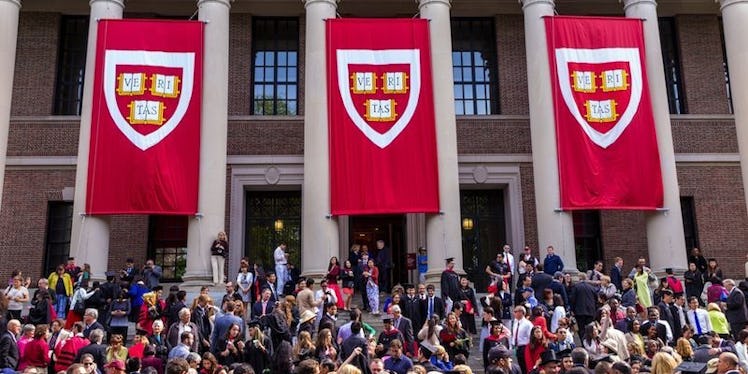
Asian-Americans' Complaint Against Harvard Shows How Harmful Stereotypes Are
Harvard University is again being accused of discriminating against students of Asian origin.
More than 60 Asian-American organizations submitted a federal complaint to the Department of Education and Department of Justice stating that Asian-American college applicants face unfair and illegal burdens.
The complaint purports to target Harvard's "systematic and continuous discrimination against Asian-Americans during its very subjective 'Holistic' college admissions process."
"Holistic" is term that gets thrown around a lot these days, often because it sounds inclusive, progressive and fair.
In theory, it's a wonderful concept that can foster a well-rounded, diverse student body.
Obviously, high test scores are not the only criteria for getting into an elite university, but are Asians being held to a different baseline?
Asian-Americans Work Harder For The Same Acceptance Letter
The accusation made by the Asian-American organizations doesn't go without evidence to back it up. The number of highly-qualified Asian-Americans has significantly increased over the past two decades.
Yet, despite the high test scores and merits of the Asian-American population, it seems the Harvard admissions team is unfairly preventing its Asian-American applications from rising above a certain quota.
Harvard, as well as the seven other Ivy Leagues, has been enrolling approximately 15-18 percent Asian-American students per year for the past decade, despite the ever-increasing pool of qualified Asian-Americans.
It looks like this might be because Asians-Americans are being held to a different standard than other students. A National Study of College Experience led by Espenshade and Radford (2009) revealed that a student who self-identifies as Asian will need 140 SAT points higher than whites, 320 SAT points higher than Hispanics, and 450 SAT points higher than African Americans.
The federal complaint against Harvard states these practices are discriminatory and make an Asian-American feel "somehow less American than his or her peers of other racial backgrounds, and he or she does not, and will not, ever have full citizenship as an American."
The "Model Minority"
But why would Asian Americans be expected to score better and be held to a higher standard? Short answer: Stereotypes.
Census reports show that, among the five major ethnic and racial groups in the US, Asian-Americans score the highest in college degree attainment rate, rates of having an advanced degree, median family income and percentage in the labor force.
Such statistics have led the Asian population to be coined the "model minority." Not only does this label glamorize the true status of Asian-Americans, it also justifies existing systems of racial inequality.
While data collected on family incomes often cite Asian families as having higher median incomes than white families, these statistics are misleading. Asian-Americans may earn more, but they spend much more to survive.
Despite their "success," Asian-American families tends to have, on average, more working family members than the average white family. Asian-Americans also live in metropolitan areas where the cost of living is higher.
When you look beyond the numbers, it's clear Asian-Americans are still facing very real financial hardships.
The Danger of "Positive" Stereotypes
Oftentimes, society is caught up in correcting negative stereotypes, but the collective voice of the Asian-American population demonstrates we need to be careful about the cost of positive stereotypes as well.
By expecting Asian-Americans to be high-achievers who are financially well-off, we disregard the sacrifices Asians may have to make in order to succeed.
In 1984, Vincent Change wrote in The Harvard Crimson, the university's student-run publication, that Asian-Americans are generalized to be humorless and unimaginative hard-workers.
Chang said this is a "tired old stereotype which so stigmatizes Asian-Americans." And he's right.
Asian-Americans are still 1.5 times more likely to live in poverty than white Americans. By assuming all Asian-Americans fit into a homogenous mold that is better off than other minorities, we neglect to give the community the attention it truly needs to succeed.
As we realize the stereotypes Asian-Americans still face today, it makes us wonder the actual fairness of the Harvard admissions team. While it is not possible to claim for certainty whether or not there is outright prejudice taking place, the situation does beg for another look into the college application process.
Imagine if we replaced applicant names with numbers and didn't record their ethnicity, race, sex and religion. Who would be getting acceptance letters then?